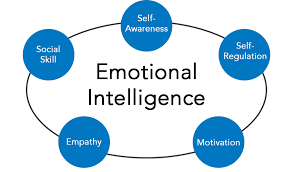
Emotional intelligence: Applications in governance and administration
Work rules are in a constant state of flux with new yardsticks by which workers are being evaluated. In today’s corporate world it is increasingly being recognised that an impressive curriculum vitae, good credentials and technical expertise does not have the desired impact in someone with low emotional intelligence (EQ). The workplace is about people and relationships, and an employee with a high EQ as opposed to only a high IQ should be seen as a valuable asset.
Mayer and Salovey (1990) assert that general intelligence accounts for approximately ten to twenty per cent of life success, defined as academic achievement and occupational status.
In a similar vein, in “Emotional Intelligence” (1995), Goleman made strong claims about the contribution of emotional intelligence to individual success, and specifically to success in the workplace. He identified intellectual intelligence as contributing 20 per cent towards life success and intimated that the remaining 80 per cent may be attributable to emotional intelligence.
Emotional intelligence is indeed significant in the workplace and is not only limited to it being a desirable quality in employees. Its uses are varied. Other examples of using EQ include the following:
Recruitment: EQ measurement is invaluable in selecting and recruiting “desirable, high-performance workers”
Predicting performance: Some companies are blending IQ testing with scientific measurement of EQ to predict job performance and direct workers to jobs where they are most likely to succeed.
Negotiation: Whether you’re dealing with a trading partner, competitor, customer or colleague, being able to empathize and be creative in finding win-win solutions will consistently pay off .
Performance management: 360-degree feedback is a common tool for assessing EQ. Knowing how your self-perception compares with others’ views about your performance provides focus for career development and positive behavioural changes
Peer relationships: Good networking skills are a staple of job effectiveness for the average worker. Networking has too often been associated with “using” other people, but a heightened EQ ensures a mutually beneficial approach to others.
The traditional view of the leader as unemotional, supremely rational and essentially mechanistic is based on the vertically integrated, hierarchical Industrial Age organisation. The leader does things; he or she makes plans and instructs others to carry them out.
Good leadership will be less about what the leader does, and more about what the leader is.
According to Davidson (2002:17-18), chief executive officers have always worked to understand others, but in the future, effective leaders will devote the same kind of effort to understanding themselves – that is, to personal leadership. Personal leadership essentially means having a heightened self-awareness – a deep understanding of one’s own behaviour, motivators and competencies – and having ‘emotional intelligence’ that allows them to accept, manage and use, rather than simply control or suppress, their emotional state.
Davidson (2002:18) affirms that ultimately, self-awareness will make tomorrow’s leaders more adaptable and that it will give them the flexibility to work across cultures, and the flexibility to deal with uncertainty, ambiguity and change.
Self-awareness will be key to effective leadership because it can have a strong impact on the perceptions of others in the organization and their willingness to follow the leader.
Self-Awareness
- Emotional self-awareness. Reading one’s own emotions and recognizing their impact; using ‘gut sense’ to guide decision
- Accurate self-assessment; knowing one’s strengths and limits
- Self-confidence; a sound sense of one’s self-worth and capabilities.
Self-Management
- Emotional self-control: Keeping disruptive emotions and impulses under control
- Transparency: Displaying honesty and integrity; trustworthiness
- Adaptability: Flexibility in adapting to changing situations or overcoming obstacles
- Achievement: The drive to improve performance to meet inner standards of excellence
- Initiative: Readiness to act and seize opportunities
- Optimism: Seeing the upside in events.
Social Awareness
- Empathy: Sensing other’s emotions, understanding their perspective, and taking active interest in their concerns
- Organizational awareness: Reading the currents, decision networks, and politics at the organizational level
- Service: Recognizing and meeting follower, client, or customer needs.
Relationship Management
- Inspirational leadership: Guiding and motivating with a compelling vision.
- Influence: Wielding a range of tactics for persuasion
- Developing others: Bolstering others’ abilities through feedback and guidance
- Change catalyst: Initiating, managing, and leading in a new direction
- Conflict management: Resolving disagreements
- Building bonds: Cultivating and maintaining a web of relationships
- Teamwork and collaboration: Cooperation and team building
Increasingly, it is noted that basic management and leadership skills are no longer enough to successfully lead organizations. Emotional intelligence is recognised as having an important role to play in management and leadership positions where differences in technical skills are of negligible importance. Consequently, emotional intelligence is becoming a soughtafter quality. Some authors on emotional intelligence are of the view that emotional competencies are twice as likely to contribute to organizational success and excellence than pure intellect and/or technical expertise alone. Accordingly, being aware of our emotions and how to manage them in ways that are appropriate and effective is an important skill for leadership, the organization, the team and the individual.
Final Destination for Punjab PSC Notes and Tests, Exclusive coverage of PPSC Prelims and Mains Syllabus, Dedicated Staff and guidence for Punjab PSC PPSC Notes brings Prelims and Mains programs for PPSC Prelims and PPSC Mains Exam preparation. Various Programs initiated by PPSC Notes are as follows:-
- PPSC Mains Tests and Notes Program
- PPSC Prelims Exam 2024- Test Series and Notes Program
- PPSC Prelims and Mains Tests Series and Notes Program
- PPSC Detailed Complete Prelims Notes
